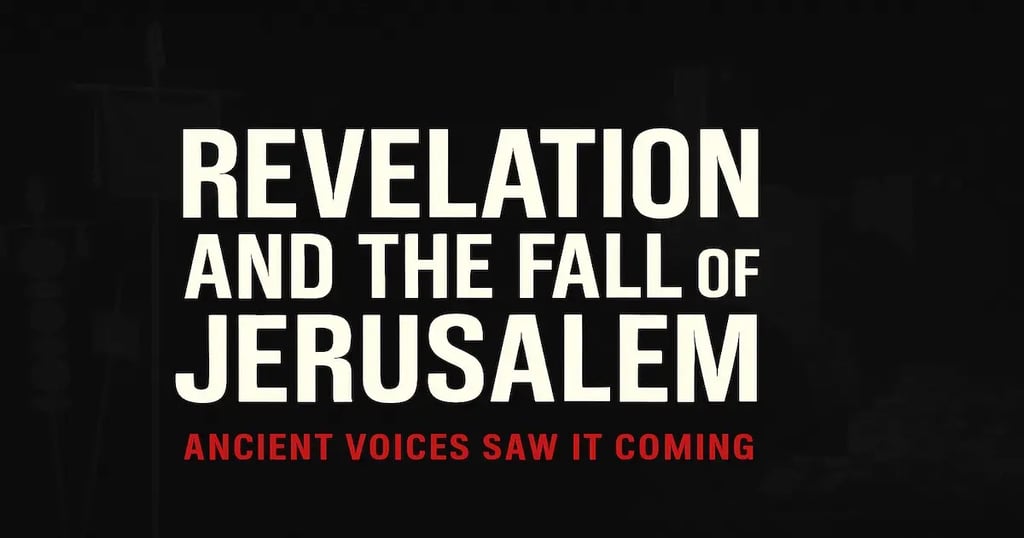Ancient Voices on Revelation: Fulfilled Prophecy or Future Fear?
Revelation Wasn’t a Warning About Our Future. It Was About Theirs
When people hear you say the Book of Revelation was about the fall of Jerusalem in AD 70, they look at you like you just invented a new religion. But here’s the reality: they’re not just mistaken, they’re ignoring what some of the early church actually believed.
Below are Christian witnesses before the 10th century who either explicitly or implicitly affirmed that Revelation was about judgment on Jerusalem. They weren’t guessing. They lived closer to the events and the context.
Victorinus of Pettau (c. 300 AD): Jerusalem as the “Great City”
Victorinus wrote the first Latin commentary on Revelation. When he reached Revelation 11:8, the city “where the Lord was crucified,” he did not turn it into a symbol. He identified it plainly:
“He calls Jerusalem Sodom and Egypt, since it had become the heaping up of the persecuting people.”
For Victorinus, the “great city” was Jerusalem, guilty of killing Christ. He saw Revelation pointing to God’s judgment on that crime. That is early preterism in writing.
Epiphanius of Salamis (c. 375 AD): John Wrote Revelation Before AD 70
In Panarion, Epiphanius gave a timeline that shatters the common story:
“John prophesied before his falling asleep, during the time of Claudius Caesar, when he was on the isle of Patmos.”
Claudius reigned from AD 41 to 54. If Epiphanius is correct, John’s visions came before the Jewish-Roman war began. Revelation was not written after the destruction of Jerusalem, it predicted it.
Apringius of Beja (c. 540 AD): John Exiled Under Claudius
Apringius agreed with Epiphanius and confirmed the early date:
“At the time of Claudius Caesar... [John] was transported into exile... to the island of Patmos, and while there he confirmed this writing.”
That puts Revelation decades before AD 70, leaving no excuse for pushing it into the time of Domitian.
Andreas of Caesarea (c. 610 AD): The Sixth Seal and Jerusalem’s Fall
Andreas preserved earlier views in his Greek commentary on Revelation. On the sixth seal (Revelation 6), he reported:
“There are not wanting those who apply this passage to the siege and destruction of Jerusalem by Titus.”
Christians before Andreas were already saying Revelation 6 was about Titus and Jerusalem’s destruction in AD 70, not some distant end of the world.
Arethas of Caesarea (c. 900 AD): Explicit Judgment on the Jews
Building on Andreas, Arethas made it even clearer. On Revelation 7, he wrote:
“Here, then, were manifestly shown to the Evangelist what things were to befall the Jews in their war against the Romans, in the way of avenging the sufferings inflicted upon Christ.”
Arethas was blunt: Revelation predicted the Jewish War as God’s vengeance for rejecting Christ. He also noted:
“The destruction at the hands of the Romans had not yet taken place.”
That means he believed Revelation was written before AD 70, which changes the way the whole book must be read.
Other Early Witnesses
Most modern teachers insist Revelation was written under Domitian around AD 95. But other ancient voices point earlier:
Epiphanius (4th century): John received the vision under Claudius (AD 41 to 54).
Syriac Version: John was exiled under Nero (AD 54 to 68).
Muratorian Fragment (late 100s): Says John wrote Revelation before Paul finished his letters, which only works if Revelation came early.
Different names, different details, but the same outcome: Revelation was written before Jerusalem’s destruction.
Why It Matters
If you’ve been told Revelation is about our future, you’ve been misled. Early Christians left clear testimony that it was about the coming judgment on the Old Covenant world.
They didn’t need prophecy charts or end-times movies. They had Scripture, and they had history, and the two lined up.
Now that you know, the question is simple: what will you do with it?
Want more? Read the post on why Jesus said “this generation” and meant it.


